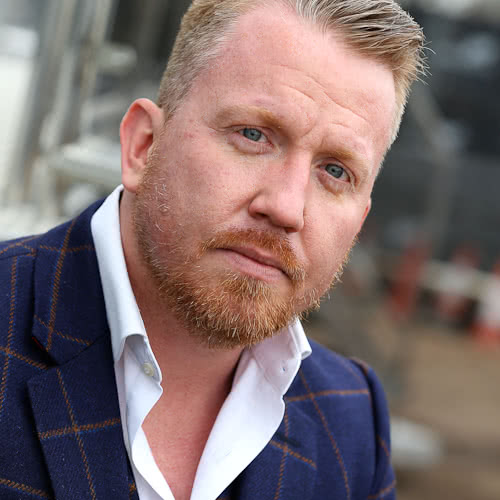Zak Roby is an Events Industry expert, with over 16 years of experience in creating, pitching, delivering and even in his early days rigging events, from London to Moscow to Dubai to Beirut and everywhere in-between, giving him a world class insight in to the industry and its’ many changes over the years.
Zak is a Director of Showplace Ltd, an Events Agency that specialises in Event Road-shows, Exhibition Stands, large scale outdoor Event Management and outdoor Event Structures.
He also owns Halcyon Consultancy Ltd, where he is regularly booked at events as a keynote speaker and motivational speaker, covering topics from the importance of local trade, how we value or don’t value our peers, being business ready and how to invest into events to produce a good ROI (and not just money!).
Hi Zak! You’ve worked in the events industry for a very long time on different types of events, all over the world. Thousands, if not millions of events take place globally every year, yet only a small handful of those events become household names.
The obvious ones from more recent years include TedTalks and Comic-Con, which people all over the world go crazy for, and in some cases will pay any amount of money to attend.
What makes these types of events more successful than others, and why do people go crazy for certain events as opposed to others?
These events have spent a great deal of money marketing themselves as not only a brand but as an event too. Plus they all share one thing, something that so many other events still seem to miss out on and fail to understand, real delegate engagement.
They give their audiences the opportunity to be involved in not only the event itself on the day, but the pre-event build up and all of the post-event activity, seeking genuine improvers from delegates and implementing them to create a better overall event experience.
It really is down to correct investment. We’ve all seen what happens to high-end shows when they start to cut budgets and eventually corners. In fact, I recently had a conversation with a client that was complaining of rapidly declining footfall at their exhibition so they decided to cut budgets.
When I tried to discuss the importance of investment to increase delegate engagement and therefore a better footfall due to a better understanding of the delegates needs, I was met with blank looks.
Some event organisers will never understand this concept, yet when you look at events like Comic-Con and TedTalks, it’s all about correct investment and never cutting corners that could affect the delegate experience. Brand, delegate experience, learn, improve, implement, a simple but effective formula for anyone looking to hold a successful event.
For the budding eventrepreneurs out there that want to create a new, high profile, household name like Comic-Con or TedTalks, what is the best way to go about it?
Firstly, know who you want to talk to. One event does not fit all, so understand your intended audience, what you want/need to say them and then say it, clearly, to the right people.
You want to aim to ensure that every delegate leaves your event knowing why they took time out of their day to attend and taking away the right message with them. Real ROI is not only about the revenue stream, it’s about ensuring your audience understands why they were sat in that room. If every delegate walks away with your brand tattooed on their skin, then you nailed it.
What are the best, and easiest ways to do market research and establish if there is a demand for such an event with a low budget?
My advice is simple. Marketing and market research is an evolving beast, and there are always new and effective ways to reach out to your potential audience, and every audience is different.
We always go back to a no ‘one size fits all’ rule for events. Hire a professional, seek their advice and use it. Ensure you brief them on exactly who you want to speak to, what you want to say and how you want the delegate to feel about your brand.
Then step back and let them devise a strategy, and follow it. Too many people attempt to do this themselves or claim that’s it’s all part of the same event mix. I can’t programme a DMX, and neither would I try! I would hire a professional, so there’s a moral there.
What are the most effective ways to get your event out there and make people hear about it?
That’s easy! Often, people or delegates that have attended your event go on to tell people how engaging your event was, and that they took so much away from the event and that they felt it was a great use of their time. If you can get your delegates to do the selling for you, then you really have created something powerful.
Which takes us back to getting the event right in first instance. Do your research, give your audience what they don’t know that they want or what they need and you will rule!
If organisers go down the road of cutting corners and budgets, then they will continue to effect the delegate experience, creating something that people will still talk about, but just not in the way you want them to talk about it, and good luck trying to lift that brand image back up.
What is your advice for people that want to successfully secure sponsorship for their events?
Offer something more than just a projected logo on a stage or their logo in an event booklet. Find out exactly what your prospects are doing as a part of their entire marketing plan and then devise a sponsorship package that fits both theirs and your needs. Don’t tell them what they want and then wonder why it’s so hard to secure that all important sponsorship.
Ask them what they want and then create something that works for both the potential sponsor and your event. Amazing things happen when people talk. There is a lot of demand for people’s budgets, so make sure yours is the best package.
What advice would you give for people that want to take their events global and organise internationally?
Whoa! One step at a time! Know your audience in every country, understand the economics of that country, the message you’re attempting to deliver and ask if that particular country or demographic really needs your message. After all, would you really try and sell or promote an event about clockwork mechanics into Silicone Valley? Audience, audience, audience; learn to accept that this isn’t just about me, me, me.
What is the best high profile event you’ve attended or organised, and what made it better than other events you’ve experienced?
I was fortunate enough to work for a very dynamic agency in my early days. I learnt so much about really making events work and I was very lucky to be surrounded by the team working on ‘WFES’ (World Future Energy Summit).
It was an incredible event held in the UAE, and the team working on it understood that using technology can help to create engagement. It was the first ever event to use a Hologram as a keynote speaker. They projected HRH The Prince of Wales onto the stage in order to reduce the carbon footprint of flying Speakers across the world to only speak for an hour. It’s still on YouTube and still ground breaking, so take a look!
They also made sure that they not only involved delegates in moving the event forward, but they also spoke to suppliers, regularly asking ‘how do you think we could improve this event?’ It’s a powerful thing to seek advice from those people doing it every day, day in, day out.
Do you think technology has hindered or boosted the events industry?
There are a lot of technology gimmicks out there that really don’t add value to events, so understand what that piece of technology does, and ask if it is a gimmick or if it truly adds value to your event and then decide if it’s worth the additional investment.
So in answer, technological gimmicks can be a total hindrance, sapping budget away from areas that may sorely need it. Correct technology used properly is nothing else but an event boost.
Where can you see the events industry heading over the next 10 years?
10 years? Who knows! I would say that any person who says they can predict business over the next 10 years is a liar or a lunatic. But I will say this, people will always need to meet face to face, as they will always seek knowledge, development and a place to meet peers and discuss what matters to them.
It’s not up to us to decide what happens over the next 10 years. It’s up to us to listen to delegates and help them achieve what their core objectives are over the next 10, 20, 30 years, and so on. If we can all understand that, then we really will be an industry that develops, grows, encourages innovation and adds value to the world of business.
And last but not least, what advice would you give to people starting their own event, or an event company that want to grow and succeed in this area?
Simple. Ask yourself, how much do you want it? Because if it doesn’t burn inside you, and if it doesn’t wake you up at 4am with thoughts of how you could do things better or wondering if you nailed that client pitch, or if you have really done enough to attract the right delegates in the right numbers, then don’t do it.
Because there are people out there right now sweating the small stuff, working that extra hour, making that extra call, meeting with that new supplier that might just have that new idea you need, and they will win that piece of business you want, they will create that perfect event and they will succeed. They are the future of events.
You can contact Zak Roby directly on zak@showplace.co.uk, find out more about Showplace here, or connect with him directly on LinkedIn.





